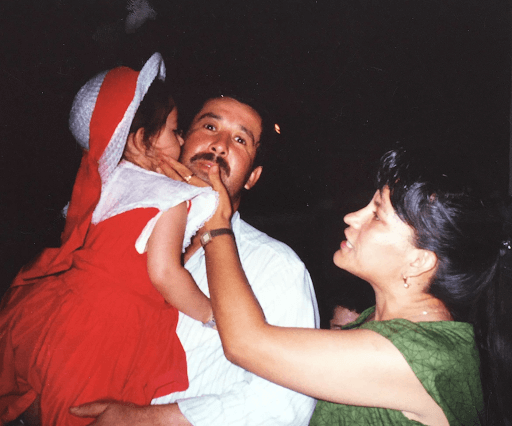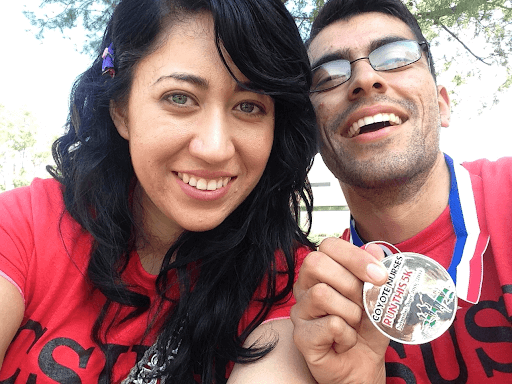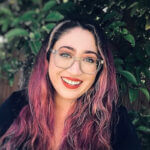When I was asked to write this, two thoughts instantly entered my brain. I thought, “Oh no, I am the worst person to write this.” I grew up attending public schools, which wasn’t a good experience for me, and I told myself I would never work in education. My second thought was, “How will I write this without emojis and memes?!” All jokes aside, given where I am in my stage of life, coming to terms with childhood trauma, being the only one in my natal family born in the US, and being a first-generation American, my statement of purpose is centered on healing.
One of the scariest things about healing from anything is reflecting, acknowledging past experiences, and deciding what moving forward looks like. It’s important to know I am a child of immigrants who didn’t speak English. As a child, it was hard to ask my parents for help with homework or to discuss what I learned in school when they didn’t know the language. I grew up in the Inland Empire in what you could call a traditional patriarchal Mexican household, with a few exceptions. I also grew up being asked if I was adopted because of my white skin and blue eyes. While I have never taken a DNA test, I can promise you I am not adopted. I could be my dad’s twin.

Despite the language barrier, I am so thankful my mom taught me how to read and write in Spanish and that my dad decided to cross the border by himself. My parents came here to provide a better life for their family. My dad always jokes he’s not a smart man. I disagree with him because he profoundly impacted my view and role in the world. My first memories were from around five years old when my dad taught me two important life lessons. The first lesson I learned was about privilege and “playing the game.” He told me I have white skin and blue eyes, which meant I was set for life here in the U.S. He told me to use being a light-skinned Mexican to my advantage in order to struggle a little less than other family members or others of our nationality who have darker skin and can’t hide their culture. The second life lesson he taught me was that I was strong and that traditional gender roles didn’t apply to me. This meant that while my mom and sister were cleaning the house or making dinner, I spent time with my dad and his friends’ horses learning what a farrier did and practicing my horse shoe-making skills.
My dad was right; I am very privileged to have a strong sense of culture and its connection to nature. With my dad, I learned that having a strong immune system comes from spending time outside, especially if you don’t have to wear shoes. From my mom, I learned that there’s a plant remedio for everything: a little mud is good for healing, Vaporu can cure anything, and if all else fails, just use sávila.
I told myself as a child I would never work in education because I had a complicated relationship with public schools. Because of the spelling of my name, the registrar’s office kept changing my gender to male, instead of female until one of my elementary school teachers changed it. I was also put in ESL classes during my first few years of school, not because I didn’t know English, but because only Spanish was spoken in my home. I learned later on in life a teacher finally advocated on my behalf to keep me in the same classroom so as not to disrupt my learning. While I loved gaining new knowledge, I noticed from a very young age that there was an inequity in who was encouraged and considered destined to be on the path to college. It took a while to heal my relationship with public schools. Working at Ten Strands has helped me move forward positively.
In my first few years of college, I was told as a first-generation college student that I needed to learn all I could and bring it back to my community so they could be on this journey with me and not be left behind. I translated that into calling my dad daily and sharing everything I learned in my classes. If he came here to give me a better life, he would hear about everything his choice provided me with. It was also in college when I met and married my husband, Carlos. He loved being outdoors and is the most important person in my life who helped me continue connecting to nature and showed me how healing being outdoors could be. On one of our first dates, he took me to hike Etiwanda Falls in Rancho Cucamonga. I’m not much of a hiker, especially with the sun and not much shade while walking up. I kept saying, “Go on without me.” Carlos grabbed my hand and said, “Let’s go, it’ll be worth it once we’re there.” And it was. Anytime we’ve been outside, and there’s some discomfort for Carlos or me, we try to be patient and support each other, taking turns leaning on one another and reminding ourselves it will be worth it.

I personally dislike the phrase that “time heals all wounds.” I think there’s more to healing than just waiting for time to pass. It’s difficult to heal and move forward without sitting with the discomfort of feeling your feelings. It takes intentional actions and steps, which makes my work with Ten Strands exciting for me. I want to use my experiences to promote changes within our systems to make them more accessible to other people with “non-traditional” backgrounds. I’m excited to continue our work and see how many other people wake up excited, thinking yes, this has been worth it.


One Response
Thanks so much, Loren, for sharing your deep and insightful reflections. It’s so great that you landed up working in education—great for us at least, and I hope it’s contributing to that elusive and courageous healing!